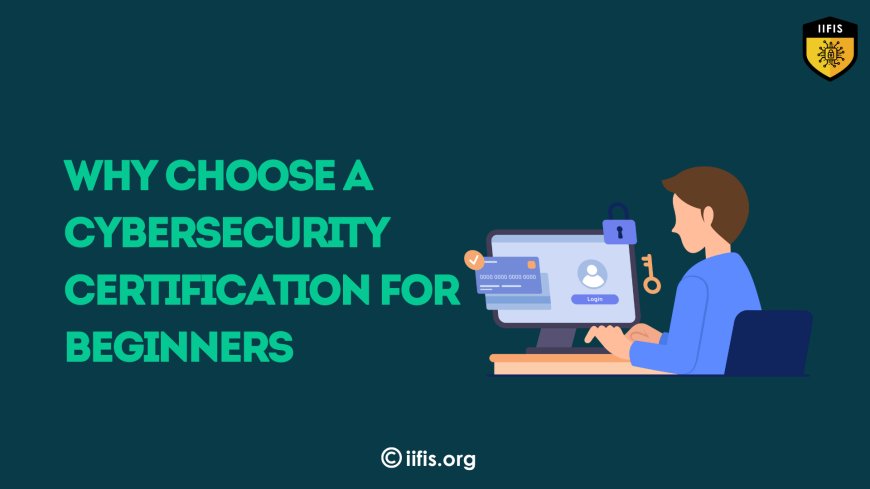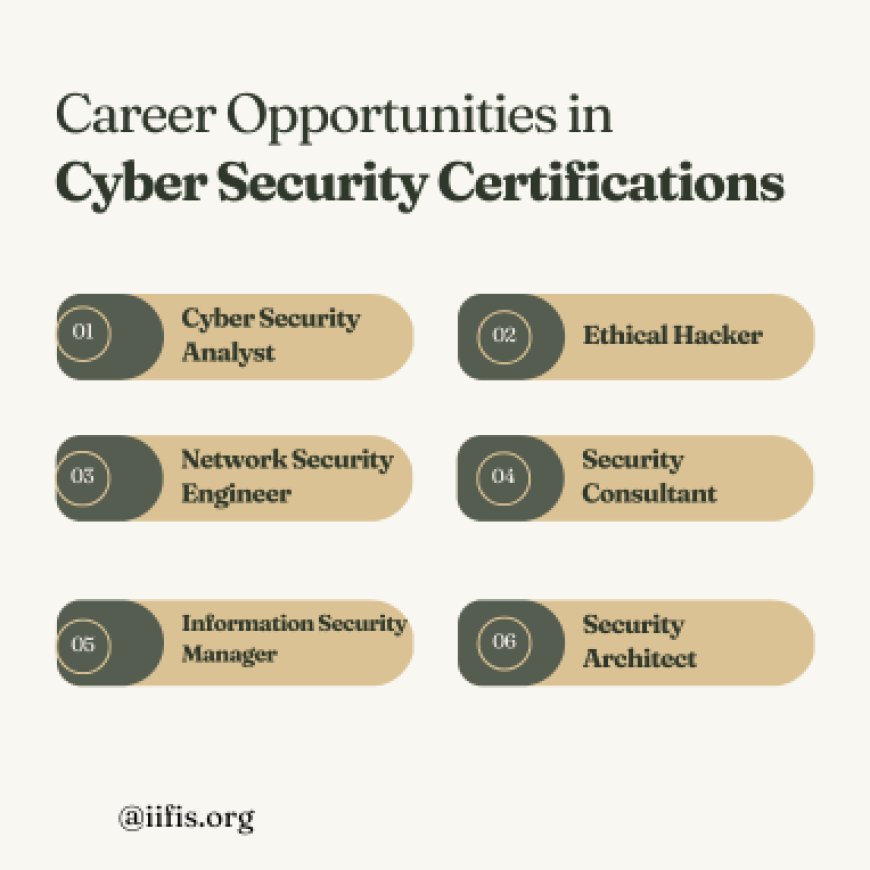Why choose a cybersecurity certification for beginners
Discover why a cybersecurity certification for beginners is the perfect first step in building a strong foundation for a career in cybersecurity. Learn essential skills, boost job prospects, and stay ahead in the fast-growing field of digital security.

I used to feel confused about what I wanted to do for a job, but then I stumbled upon cybersecurity. I've always been into technology, but I didn't know how to turn that interest into a career. When I decided to pursue a cybersecurity certification for beginners through IIFIS, I was amazed at how simple and fulfilling it was. It opened my eyes to new opportunities I never knew existed and taught me the essential skills to protect digital information. Going through the certification not only enhanced my tech abilities but also made me feel more confident, preparing me for a field that is super important and constantly evolving in today's tech environment. With the quality education and support from IIFIS Certification, I felt well-equipped to tackle the challenges of the cybersecurity environment.
Cybersecurity is super important right now. As cyber threats keep rising, both companies and people need skilled experts to protect their information. Getting a cybersecurity certification for beginners is a great idea for anyone wanting to jump into this fast-growing area. These certifications provide a clear way to learn key skills, grasp industry rules, and build trust in the job market. Whether you're changing jobs or starting a new journey, a certification can be your first step toward a fulfilling and meaningful career in cybersecurity.
What are cybersecurity certifications?
Cybersecurity certifications are credentials that validate an individual's knowledge and skills in protecting systems, networks, and data from cyber threats. They cover various topics, including network security, risk management, and incident response, equipping professionals with the expertise needed to address security challenges. These certifications are offered by recognized organizations and serve as a valuable asset for job seekers in the cybersecurity field, demonstrating their competence and commitment to maintaining digital security in an increasingly vulnerable technological environment.
Understanding Cybersecurity Certifications
Cybersecurity certifications are credentials that validate an individual's knowledge and skills in various aspects of cybersecurity. For beginners, these certifications serve as an introduction to the field, covering foundational topics such as network security, risk management, and incident response. They provide a solid groundwork for those looking to advance in their cybersecurity careers.
-
Types of Certifications Offered by IIFIS
There are several types of cybersecurity certifications available, catering to various levels of expertise. For beginners, foundational certifications like CompTIA Security+, Certified Ethical Hacker (CEH), and Cybersecurity Fundamentals from ISC² are excellent starting points. These programs offer a well-rounded introduction to key concepts, terminology, and practices in cybersecurity.
-
Certification vs. Degree
While traditional degree programs in cybersecurity offer a comprehensive education, certifications can often be completed in a shorter timeframe and at a lower cost. This makes them an appealing option for beginners who want to enter the workforce quickly and gain practical skills without the lengthy commitment of a degree.
Why Pursue a Cybersecurity Certification for Beginners?
1. Growing demand for cybersecurity professionals
The demand for cybersecurity professionals continues to surge as businesses and organizations prioritize their digital security. According to recent reports, job openings in the cybersecurity field are expected to grow significantly in the coming years. By earning a Cybersecurity Certification for Beginners, you position yourself as a qualified candidate for these roles, making you more attractive to potential employers.
2. Hands-On Learning Opportunities
Many certification programs focus on practical, hands-on learning. This approach allows beginners to apply what they've learned in real-world scenarios, which is crucial for mastering cybersecurity skills. Through labs, simulations, and case studies, you will gain invaluable experience that prepares you for the challenges you'll face in the field.
3. Building a Professional Network
Pursuing a cybersecurity certification for beginners often connects you with fellow learners and industry professionals. This networking opportunity can lead to valuable contacts, mentorship, and potential job leads. Engaging with peers in the cybersecurity community can provide support and insights, enhancing your learning experience.
What to Expect from a Cybersecurity Certification Program
1. Curriculum Overview
The curriculum for a cybersecurity certification for beginners typically includes a mix of theoretical knowledge and practical skills. Key topics often covered include:
-
Network Security: Understanding firewalls, VPNs, and secure network architecture.
-
Risk Management: Identifying, assessing, and mitigating cybersecurity risks.
-
Incident Response: Learning how to respond effectively to security breaches.
-
Ethical Hacking: Gaining insight into how attackers think and operate.
2. Assessment Methods
Assessment methods for these programs can vary, but most include quizzes, hands-on labs, and final exams to gauge your understanding of the material. Some programs even offer project-based assessments, allowing you to demonstrate your skills in applications.
The Value of a Certification from IIFIS
IIFIS specializes in providing high-quality certifications in cybersecurity. Their Cybersecurity Certification for Beginners program is designed to equip learners with the necessary knowledge and skills in a structured format. By choosing IIFIS, you benefit from:
-
Expert Instruction: Courses are led by experienced professionals in the field, ensuring that you receive current and relevant information.
-
Flexible Learning Options: IIFIS offers both online and in-person training, allowing you to choose the mode that best suits your schedule and learning style.
-
Recognition and Credibility: Certifications from IIFIS are recognized in the industry, giving you an edge in the job market.
Preparing for the Certification Exam
1. Study Resources
To succeed in your cybersecurity certification for beginners, it’s crucial to utilize various study resources. Textbooks, online courses, and practice exams are excellent tools to help you prepare. Joining study groups can also enhance your understanding through discussion and collaboration with peers.
2. Practice Makes Perfect
Hands-on practice is essential in cybersecurity. Set up a lab environment to experiment with security tools and techniques. Many online platforms offer virtual labs where you can practice real-world scenarios safely.
Career Opportunities Post-Certification
Once you've completed your cybersecurity certification for beginners, numerous career paths await you. Some popular roles include:
-
Certified Penetration Tester (CPT): This certification focuses on the techniques used by ethical hackers to test and secure systems, providing beginners with practical skills in penetration testing.
-
Certified Cyber Security Manager (CCSM): This certification is designed for those aspiring to manage cybersecurity teams and initiatives, emphasizing leadership and strategic planning in cybersecurity.
-
Cyber Security for Leaders: This program helps individuals in leadership roles understand cybersecurity risks and how to effectively manage them, making it ideal for those looking to bridge the gap between technical and managerial aspects of cybersecurity.
-
AI Cyber Security Associate: As artificial intelligence becomes increasingly integral to cybersecurity, this certification introduces beginners to the intersection of AI technologies and security practices.

The Importance of Continuous Learning
Cybersecurity is a field that evolves rapidly. As technology advances, so do the tactics used by cybercriminals. Therefore, it's essential to embrace continuous learning. After obtaining your cybersecurity certification for beginners, consider pursuing advanced certifications, attending workshops, and participating in cybersecurity conferences. These activities keep your skills sharp and allow you to stay current with industry trends and emerging threats.
Developing Soft Skills Alongside Technical Skills
While technical knowledge is critical in cybersecurity, soft skills are equally important. Communication, problem-solving, and analytical thinking are essential abilities for cybersecurity professionals. Certifications often include components that help you develop these skills through group projects, presentations, and case studies. Building these soft skills can enhance your effectiveness in a cybersecurity role, allowing you to work better with teams and articulate complex ideas to non-technical stakeholders.
Real-World Applications of Cybersecurity Knowledge
As you progress through your Cybersecurity Certification for Beginners, you'll find how to apply your knowledge in real-world scenarios. Understanding cybersecurity principles allows you to help organizations mitigate risks, protect sensitive data, and comply with regulations. For instance, you may work on developing security policies for businesses or perform risk assessments to identify vulnerabilities. The ability to translate theoretical knowledge into practical applications is what makes cybersecurity professionals valuable.
The Role of Cybersecurity in Today's Digital Environment
In an increasingly connected world, cybersecurity plays a crucial role in safeguarding both personal and organizational information. Data breaches, cyberattacks, and identity theft are rampant, making the need for skilled professionals more pressing. By obtaining a cybersecurity certification for beginners, you're not just advancing your career; you're contributing to the safety and security of the digital environment. This sense of purpose can be highly rewarding, as you help protect against potential threats that can have significant consequences.
Obtaining a cybersecurity certification for beginners can significantly impact your career trajectory in the tech industry. Not only does it enhance your knowledge and skills, but it also boosts your employability in a high-demand field. As I learned from my experience, certifications pave the way for new opportunities, equipping you with the necessary tools to protect sensitive information and combat cyber threats. If you’re ready to take the first step towards a fulfilling career in cybersecurity, consider enrolling in a program offered by IIFIS, where you can gain valuable insights and skills that will set you up for success. By investing in a cybersecurity certification for beginners, you're investing in your future and making a meaningful contribution to a safer digital world.























